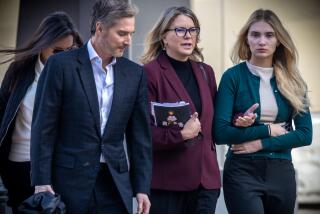Judge Finds Apparent Collusion in Case
- Share via
A U.S. District Court judge in Los Angeles said Monday that “it would appear at first blush there was collusion between state and local authorities” to block the release of Thomas L. Goldstein after a federal appeals court in December overturned his murder conviction and ordered him freed immediately.
But Judge Dickran M. Tevrizian added that he did not have jurisdiction to release Goldstein because the Los Angeles County district attorney’s office had filed new charges in the 24-year-old murder case. Since there is a new case, the federal courts no longer have any authority to act, the judge told federal public defender Sean K. Kennedy, who represented Goldstein at Monday’s hearing.
For the record:
12:00 a.m. Feb. 13, 2004 For The Record
Los Angeles Times Friday February 13, 2004 Home Edition Main News Part A Page 2 National Desk 3 inches; 101 words Type of Material: Correction
Goldstein incarceration -- The headline “Judge Finds Apparent Collusion in Case,” on an article in Tuesday’s California section about the continued incarceration of Thomas L. Goldstein, may have implied incorrectly that a judge ruled that collusion took place between state and local authorities to hold Goldstein after a court ordered his release. U.S. District Judge Dickran M. Tevrizian was quoted in the story as saying “it would appear at first blush” that such collusion occurred, but his remarks did not constitute a formal ruling. In the headline, the word “finds” was not meant as a synonym for making a legal decision.
Deputy Dist. Atty. Brentford Ferreira said that there might have been “a misunderstanding” regarding Goldstein’s situation, but that there was no “game-playing” by authorities to hold Goldstein improperly.
Monday’s hearing was the latest chapter in a labyrinthine case that started with the November 1979 murder of John McGinest, who was killed by four shotgun blasts while running down a Long Beach street. Goldstein, who lived near the scene of the slaying, was arrested later that month. He always has maintained his innocence. No physical evidence tied Goldstein to the crime or to the victim.
Goldstein was convicted by a jury and sentenced to 27 years to life in March 1980. There were two primary witnesses against him: Edward F. Fink, a jailhouse informant, said Goldstein had confessed to the slaying while the two briefly shared a cell in the Long Beach jail. Loran B. Campbell said he saw Goldstein running with a shotgun near the crime scene on the night of the murder.
Federal judges overturned Goldstein’s conviction after finding that the two witnesses, both of whom are now dead, were problematic. Fink testified as part of a secret deal to get a lighter sentence on theft charges he faced, the judges found. Prosecutors denied Goldstein a fair trial by not revealing the deal, the judges ruled.
Campbell testified in a federal hearing that he had always harbored doubts about his identification of Goldstein, but had made his statements at the original trial after police assured him that he had the right man.
Fink, who was arrested at least 35 times before his death in 1994, testified in 10 cases -- including seven involving murder charges -- each time saying the defendant had confessed to him while sharing a cell. Since Goldstein’s case, evidence has emerged that prosecutors, prison officials and judges considered Fink untrustworthy.
In December, when the U.S. 9th Circuit Court of Appeals overturned Goldstein’s conviction and ordered him released, the judges gave the state 60 days to decide if it wanted to retry the case. Instead of releasing Goldstein, state corrections officials turned him over to Los Angeles authorities, who had filed an order on Dec. 15 saying they wanted him detained pending a retrial. Local officials were able to hold him because they were not covered by the court order.
On Jan. 30 the 9th Circuit directed Tevrizian to conduct a hearing on whether state and local law enforcement officials should be held in contempt of court for the way they responded to the court’s Dec. 4 order to release Goldstein immediately.
Tevrizian subsequently asked the U.S. attorney’s office to investigate the matter, but the federal prosecutors have declined to be involved, saying their frequent work with local and state law enforcement agencies would create a conflict of interest, Tevrizian said Monday. U.S. Magistrate Judge Robert N. Block will ask the Justice Department in Washington to provide a lawyer to investigate the contempt matter.
Goldstein now faces a Feb. 18 preliminary hearing on the retrial of his case. Deputy Dist. Atty. Ferreira said Monday that prosecutors would present a new witness at that time.
“Another jailhouse informant?” asked Tevrizian.
“Absolutely not,” responded Ferreira.
After the hearing, defense lawyer Dale M. Rubin expressed frustration that he has not been given the identity of the witness. Defense attorneys normally are entitled to a prosecution witness list 30 days before a preliminary hearing, he said. Ferreira said the district attorney’s office was not making the name public yet, but added, “it won’t be long.”
More to Read
Sign up for Essential California
The most important California stories and recommendations in your inbox every morning.
You may occasionally receive promotional content from the Los Angeles Times.













